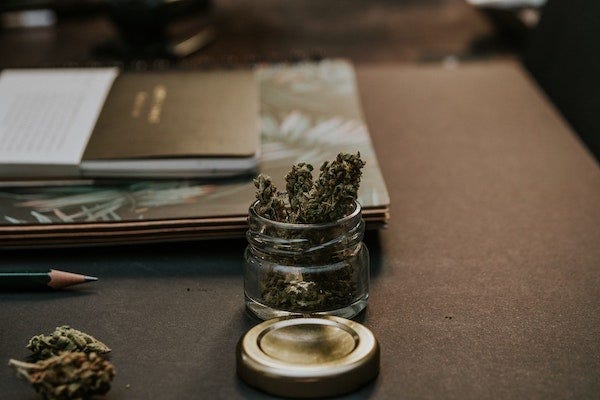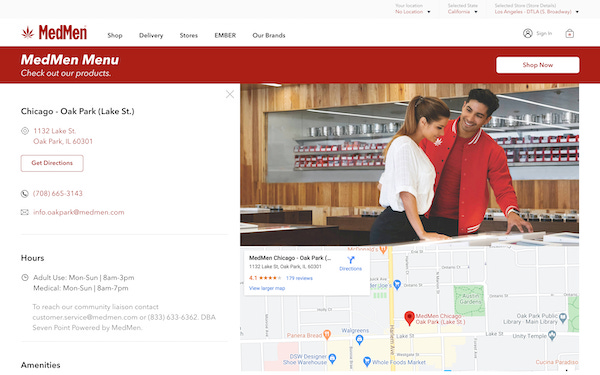A recessionary buzzkill? Dispensary33’s PSA on Coronavirus, Gold Coast grass and more…
No cannabis company was “game planning for a pandemic”

Many cannabis companies were already distressed. How might they fare in a recession? [Image: Yash Lucid/Pexels]
How will the fledgling cannabis industry – which came of age during an historic period of market expansion – withstand a coronavirus-infused bear market and economic downturn?
“You have significant players who are already distressed,” explains Mike Luce of Chicago-based High Yield Insights. “Of all the exogenous factors strategists looked to – tariffs, 2020 elections, legality, etc. – no one was game planning for a pandemic. Not every company is prepared to cope with it.”
The first generation of significant companies in the sector were already experiencing a liquidity crunch.
Investment firms like Chicago-based NewLake Capital are quickly acquiring properties, dispensaries and other assets of impacted cannabis companies, including Chicago-based Cresco Labs, Grassroots Cannabis and PharmaCann. (NewLake, incidentally, was co-founded by Pete Kadens, co-founder and former CEO of Chicago-based Green Thumb Industries.)
“Lots of companies will go away, and a good number of interesting acquisitions will emerge”, predicts Michael Gruber of Salveo Capital, a Northbrook-based VC firm focused on the cannabis sector. “That being said, the industry will be here. For the most part, I see cannabis as being an anti-recessionary product. People will continue to buy.”
Of course, human beings have had at least a 2,500-year relationship with the plant. Cannabis has long been a multi-billion dollar underground industry.
In Illinois, despite irregular access to product, recreational consumers spent more than $75 million on legal cannabis through the first two months of 2020. More states are legalizing or at least loosening restrictions to purchase medical cannabis.
However, if an economic downturn ensues, will recreational consumers still line up to pay close to a 40 percent tax rate for products they can less illegally procure from the underground market?
“Unless you already have the illicit market as an option,I don’t know if we’ll see a lot of shift,” says Luce, who is scheduled on March 25 to present on “Creating data-driven decisions on cannabis” to the Chicago Innovation Roundtable at TechNexus. “More likely, we may see consumers shift from higher priced categories like vapes and edibles to lower-priced options like flower.”
Sales of alcohol – long-considered recession proof, although in 2009 took a dip – can serve as a useful but not entirely complete proxy when projecting how cannabis sales would fare in a downturn.
Anyone 21 and over, for instance, can easily buy a six-pack at the local convenience shop. Cannabis, particularly in Illinois, is not nearly as accessible as there are currently fewer than 50 dispensaries across Illinois that are licensed for recreational sales. Further, the fast-tracking of the June 2019 legislation to meet a January 1, 2020 launch date meant that growers and processors could only have so much supply available on day one.
As we are observing, in Illinois there is not enough product right now to meet demand. Supply chains will take months to normalize, as more cultivation capacity is built in-state. It may take years for the federal government to approve transportation of cannabis with THC across state lines (hemp and CBD is another story).
Expect similar commercial restrictions in the next wave of states on track to legalize recreational sales, most notably New York. Like Illinois, legalization would likely come via state legislation (as opposed to a ballot referendum) giving states more authority to limit and control inventory.
“Supply and demand can vary drastically by market,” says cannabis entrepreneur and investor David Friedman or Chicago-based Panther Capital. “Demand outstrips supply in heavily regulated states but less so in more developed states like Colorado.”
In these unprecedented times, nobody has a crystal ball. There is no predicting how our society’s response to coronavirus will impact our economy, much less the sales growth of an emerging and to date vastly expanding industry.
We won’t have clarity on this – or much else – until we are on the other side of the pandemic.
In the meantime, if you’re so inclined and practice rigorous social hygiene, smoke em if you got em.
Most Vapes are Manufactured in China. Now What?
The hardware used for cannabis vapes is primarily manufactured in China.
As Barron’s reports, trade disruptions resulting from the coronavirus outbreak will likely reduce supply of vapes in the United States and Canada, where they are increasingly popular among consumers.
Eight Capital analyst Graeme Kreindler suggests that better capitalized cannabis companies including Canopy Growth and and CuraLeaf Holdings are now stockpiling hardware preparing for the worst.
Closer to home, Kreindler says Chicago-based Green Thumb Industries and Cresco Labs, because of their diverse product portfolios, are well positioned to withstand prolonged delays in vape imports.
Marijuana Business Daily is also reporting that many cannabis companies now are looking to divert packaging for their products from China to the United States, Mexico and India.
Dispensary33 asks for community cooperation, encourages care-givers
Dispensary33, which began selling medical cannabis in Chicago five years ago and as of January 1 also sells to recreational consumers, is asking customers to show common sense and compassion when purchasing product in this new era of social distancing.
The store, based in Chicago’s Andersonville neighborhood (the owners hope to open a second location in the West Loop), issued a public service announcement of sorts via social media and an email to its community.
The headlines…
A pre-ordering system is available to limit touching while in the store.
Patients with weak immune systems should have authorized care-givers do their shopping for them.
Recreational consumers feeling under the weather should send a friend or hold tight until they are better. Sanitizer is on hand for those with a sniffle.
Drink your fluids and smoke your veggies.
Cannabis Company Tracker: MedMen, Acreage Holdings, Fyllo, leaf.trade., Verano, Green Thumb Industries
News and notes of cannabis companies doing business in Illinois.

Los Angeles-based MedMen, which operates a dispensary in Oak Park, received a city permit for a location at 1001 W. North Avenue in the heart of the Clybourn Corridor.
Los Angeles-based MedMen, a distressed publicly-traded cannabis company, laid off 128 employees last month but hopes to expand its presence in Illinois. The company, whose deal to acquire Chicago-based PharmaCann for $680 fell through last fall, was issued a permit to open a dispensary at 1001 W. North Avenue. Often referred to as “The Apple Store of Dispensaries” due to its design and customer experience, the Chicago MedMen location would sit adjacent to the Clybourn Corridor Apple Store. Chicago investors Dan Tierney and Stephen Schuler hold significant financial stakes in MedMen and PharmaCann.
Acreage Holdings, a New York-based cannabis company that includes the likes of former House Speaker John Boehner and former Canadian Prime Minister John Mulroney on its board of directors, received city approval to open a Nature’s Care dispensary location at 810 W. Randolph Street in the heart of Chicago’s West Loop.
Marketing technology startup Fyllo, which is based in Chicago and sells compliance software and services to cannabis brands and agencies, hired Buddy Media co-founder Jeff Ragovin as its first Chief Commercial Officer. Buddy Media, which helped big brands market on social media, in 2007 was acquired by Salesforce for $745 million.
Leaf.trade, a Chicago-based ordering and fulfillment software provider for cannabis retailers that raised $4.2 million last year in a venture round led by Chicago-based Hyde Park Angels, expanded its distribution partnership with Verano Holdings, a multi-state cannabis retailer, cultivator and processor that was started in Chicago and acquired by Phoenix-based Harvest Health for $850 million in stock in 2019. As part of the deal, leaf.trade will serve Verano’s Nevada-based dispensaries.
New York-based cannabis-focused real estate investment trust Innovative Industrial Properties is committing $50 million to acquire and upgrade an Oglesby, Illinois-based growing and processing facility built and initially owned by Chicago-based Green Thumb Industries. Green Thumb Industries will lease back and continue to operate the facility.
Roll Call: Paul Groshko, Marcy Capron Vermillion, Michael Malcom
A few words about notable figures making news within Illinois cannabis industries.

A CBD spa pioneer, “one women product development machine”, and a weed travel blogger. [Images from LinkedIn]
Former Starbucks executive and Chicago Regional Director Paul Groshko is now pioneering the use of CBD in swedish and deep tissue massages. The owner of Lincoln Park-based spa Spavia explained to the Chicago Tribune, “The products are targeted for pain relief, and they leave sore muscles feeling relaxed and soothed.”
A self-described “one women product development machine”, Chicago serial entrepreneur Marcy Capron Vermillion today turns her talents to CBD. Specifically, Capron Vermillion is the co-founder of Chicago-based Equilibria, which helps customers know their dose before they purchase anything from them. Coco Meers, who founded beauty scheduling app Pretty Quick in 2012 and sold it to Groupon in 2015, is also a co-founder of Equilibria.
Weed renaissance man Michael Malcolm is a brand ambassador for cannabis companies and advises the industry on how to connect with consumers and stake-holders in communities most impacted by the previous drug laws for his agency WTF Media. He incorporates these and other experiences in his tourist adventure blog Weed Travel Food.



